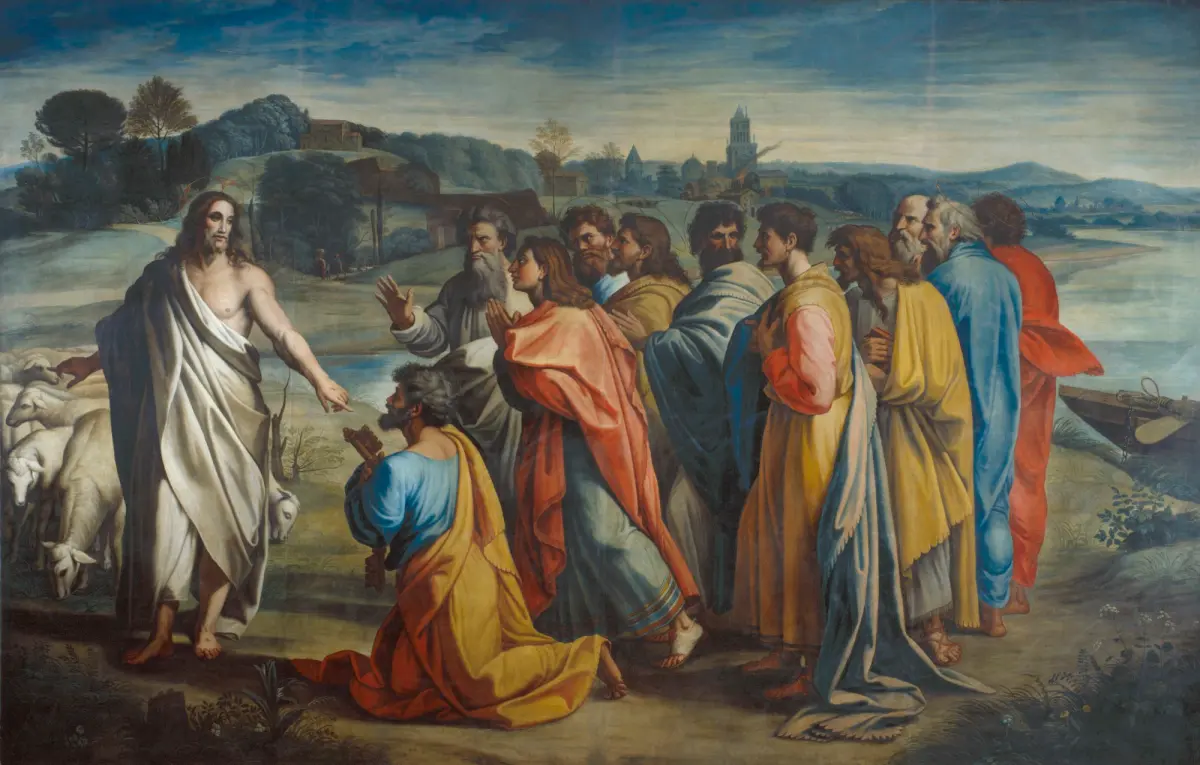In the shadow of Caesarea Philippi, where the rocks whisper older hymns and the waters recall the memory of vanished gods, the Logos turns his face towards Jerusalem. His voice carries the gravity of revelation, and He speaks openly of wounds, death, and a rising whose secret is locked behind stone. Those who follow listen, disturbed by the sudden lifting of veils. They, who loved Him as man, now recoil before the fullness of the Word. One among them, called Peter, rises in protest; a cry from the heart, pleading the avoidance of pain. The Logos responds swiftly, a sword unsheathed: “Get behind me, Satan; you think according to men, and not according to God.” The echo of that word shivers through the centuries, a mirror held to every heart that seeks to preserve itself against the necessary sacrifice.
I. The Voice of Flesh
Peter, who had moments before named the Logos “Christ,” receives a harsher name. Yet this carries no judgment of malice, merely an unmasking of what resides within flesh, a reflexive resistance to the blade that must pierce through to Spirit. Peter speaks not from evil, but from tenderness; his impulse is to protect the beauty he has known. It is the voice that murmurs gently, urging preservation, pleading for mercy against the harshness of destiny. Such Love, though humanly noble, binds the Word to the world’s fleeting comforts. It is the impulse to hold fast the transitory, to preserve the flesh from its appointed hour of dissolution and rebirth. Nevertheless, the Logos recognises this voice as an adversary precisely because it opposes the required movement of Love towards sacrifice. Love, if it remains in flesh alone, becomes resistance; it becomes an obstacle clothed in kindness. Peter’s plea is humanity’s quiet refusal of the first step, the gentle dissent that would bind the Divine into forms that pass away, to comforts that shield against the cutting clarity of Spirit.
II. The Necessity of Wounding
The Logos does not scorn flesh; it seeks rather to transform it. But transformation demands the openness of the wound. There is no birth without breaking, no revelation without the shattering of the old. When the Logos proclaims the inevitability of rejection, suffering, and rising, he speaks of the soul’s path towards its Divine completion. The disciple recoils because he senses the cost; he perceives clearly that to follow the Logos means to surrender the cherished comforts of illusion. The wound, therefore, is not punishment. It is the narrow gate through which the soul must travel naked, stripped of all that would obscure the radiant truth beneath. Flesh, beautiful yet ephemeral, must yield to Spirit. The sword of the Verbum pierces precisely to heal, opening a space where the luminous truth may dwell fully. Without the wound, there can be no true intimacy with the Mystery. Without the cross, the fullness of resurrection remains veiled.
Coda: Moonlit Meditation
Under lunar glow, one contemplates that naming: “Satan.” A word uttered not to condemn, but to clarify. It shines softly as moonlight, revealing that even tenderness can become resistance; even care can turn into subtle betrayal when it seeks to detour the soul from its destined path. In silence, the image of Peter softens, revealing every disciple who has feared the sharp edge of sacrifice. Beneath this naming lies mercy, a call to awaken from slumber and embrace the necessity of passage through darkness into Light. The Logos does not disdain humanity; it loves deeply enough to wound, for Love without clarity is bondage. In the darkened hours before dawn, let the heart accept this truth: to follow the Logos is to consent to the fullness of the blade. Let the veil fall quietly; let the heart learn to say “Amen” before the sword.
Fiat Lux.
